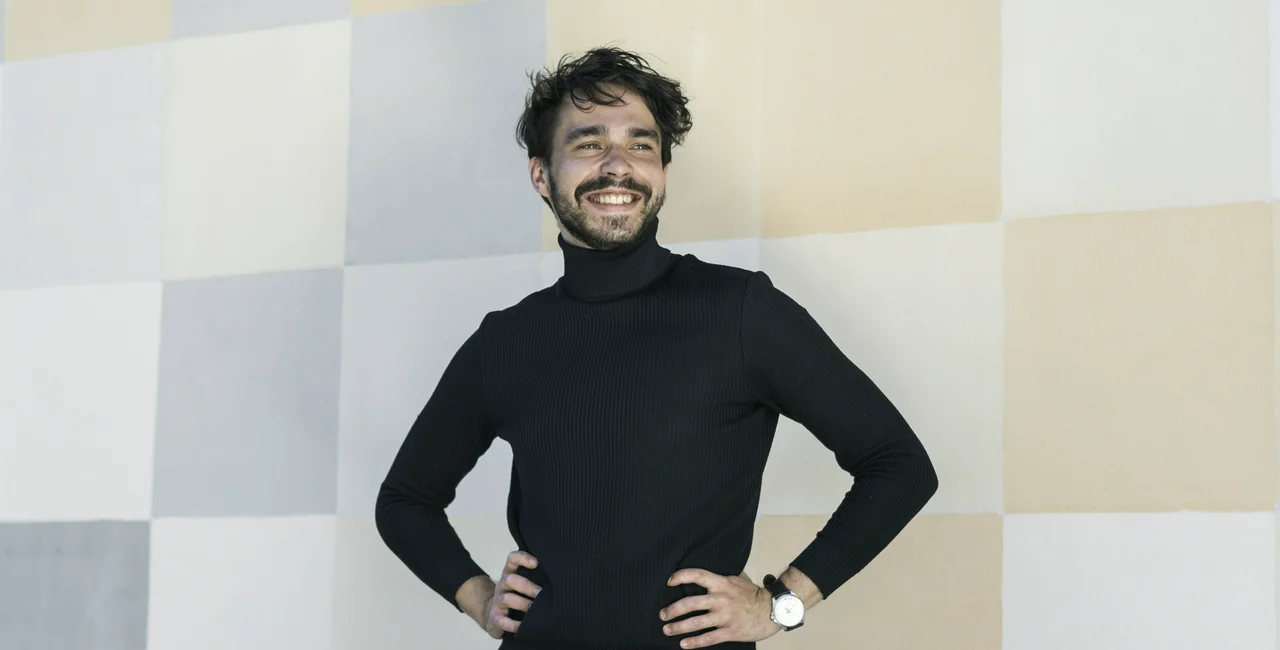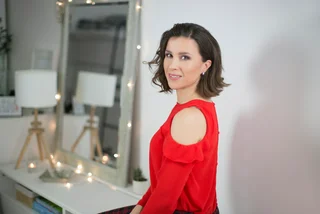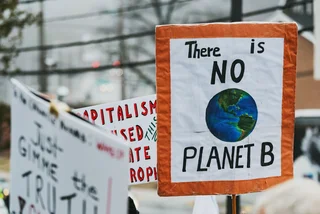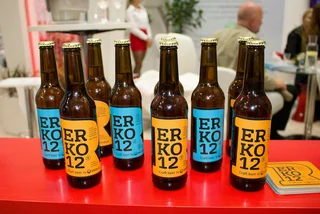Stepan Vashkevich is a Belarusian researcher and project coordinator at the Prague-based Institute of Circular Economy (INCIEN). The organization's mission is to act as a catalyst for fostering both the bottom-up and top-down transformation towards a circular economy as a pathway to a carbon-neutral and environmentally sustainable society. Vashkevich is an expert in the field of circular economy application for the textiles and plastics sectors, as well as a consultant for companies seeking a transition towards circular business models. Expats.cz spoke with Vashkevich, previously the editor-in-chief of Zajimej.se, the first Czech media to give substantial coverage to circular economy topics, about INCIEN's work as a founding member of the Change for the Better platform and the future of circularity in the Czech Republic.
Prague recently signed the Circular Cities Declaration. How does the Czech capital compare to other world cities in its approach to circularity?
At the times when the Declaration was signed, following the successful Prague Circular City Scan project, we saw the ambitions were set high. City Scan showed the pathway for a circular future of the Czech metropole. The innovations, which were brought to the table, were focusing on three key areas – closing the material loops for biowaste materials, circular procurement and building the pilot projects for reuse centers in Prague. Not long after the City Scan was completed, the Covid-19 crisis changed the current discourse phenomenally, and we would say, that Prague is right now on the crossroads in terms of its future development. While some cities, like Amsterdam, clearly embrace the circular vision as a means to recovery leading towards a low-carbon and circular economy, other cities fall into the financial turmoil following the first wave of the pandemic and are very cautious with investment to sustainable transition and recovery.

So far, the Mayor of Prague has declared the continuation of the further development of circular strategies in Prague, however, at the beginning of the second wave we can’t clearly foresight the future development. We cherish the beginning of transitions towards a low-carbon economy and resilient urban economies, which we can find in the City of Milano, or the City of Maribor. These transitions may be perceived as a blueprint development: cities are the laboratories for the future where one can use an unprecedented concentration of resources, talents, and materials to embrace the full circularity, which can evolve into examples of transitions for less environmentally conscious regions.
Prague's leaders are also very committed to the smart cities platform. How does technology go hand in hand with circularity?
Smart cities and circular economy approaches may be perceived as mutual benefactors. For circular cities, some processes and technological solutions go hand-in-hand with the innovations in the field of circular economy. Smart city tracks its material flows, knows precisely where stock materials are accumulated, manages the sharing economy, which enhances the product’s life cycle. As for example – sensors installed in the trash bins may help to optimize the collection processes and reduce the carbon footprint of necessary transportation of waste. Digital platforms for energy prosumers allow for generating energy sustainably and in a decentralized manner. This boosts the resilience of the city and the same goes for urban agriculture. Unfortunately, though the image of smart city platform may be damaged in the eyes of the public for example by installing nascent technologies, such as smart benches, let’s say – but the whole concept is a promising tool for the future sustainable cities. As with every tool, it is important to point out that circularity is about materials and people, but collecting big datasets and capitalizing on them may lead to grievous security risks for civil rights and social distorting, as we may see on the usage examples of the face recognition technology in different countries.

Can you name some businesses or individuals in the Czech Republic who are leaders in the push toward a more circular economy?
We truly admire Lenka Mynářová, the CEO of Nafigate. She is one of the most prominent voices in pushing R&D towards circular solutions in Czechia. Lenka stands behind the development of the Hydal technology, which is an upcycling technology, inspired by nature. With the help of bacteria, Hydal produces polymer PHB out of wasted cooking oil, which makes it 100% biodegradable. Many other companies are driving the circular models themselves, such as IKEA which has a “Second chance for a furniture project’’, or Mattoni, which drives the discussion around the closure of the material loops for beverage packaging with the help of deposit return systems, as we know them from other European countries.

Even though one can perceive Czechia as a country which is behind more ambitious countries in terms of circular economy, our believe is that Czechia can be a cradle for circular innovations. For example, in the publication ‘’Circular Czechia” we select a handful of companies each year which have circularity aspects in their DNA thus inspiring other companies to change.
What have been some of the biggest milestones and successes since the establishment of INCIEN? Are you making progress as an organization?
Already, for 5 years we have been working on the closure of material loops and on better resource efficiency in Czechia. Those five years were very turbulent and fruitful at the same time, and we are glad that we managed to get circular economy from the very niche and marginal position towards one of the prominent topics in society. In 2015 there were only 150 articles about the circular economy posted in Czechia. Between 2015/2020 there were 10,653 media outputs published concerning Circular Economy, of which 25 % were connected to our Institute and our work.

This was achieved by organizing large conferences, educating the public, tight cooperation with public and business sector, as well as with the help of successful pilot projects, which brought the idea of circular economy to the public in a very understandable form: for example, we were at the onset of testing and scaling the conversion of municipal wastewater sludge into bio-based compressed natural gas (BioCNG). We, as a society, lose an immense flow of biomaterials, like sewage sludge which, however, can be used for better purposes. That was the core of the project in Brno, where sewage sludge started to be collected for biomethane production, which then powered the municipal buses. This project was very well accepted among public and it resulted in receiving the E. ON Energy Globe, which is the prestigious award for best sustainability projects in Czechia.
That was the example of our work very tightly connected to waste per se. For the companies and municipalities, we were coming in a momentum when the waste was generated – and there our work started. Now our perceptions changed – we come at the beginning of the cycle. Through years of practice, we understood that we can recycle as much as we want, or we might dream about sufficient real material loops closing capacities, but it won’t happen unless there is a demand for it. Therefore, we are focusing on topics like circular procurement, because we believe that it has a chance to boost real recycling in Czechia whilst reducing carbon footprint significantly. This transition shows the development of INCIEN which is a flexible organization and which reacts to the newly arising challenges.
Sustainability has become incredibly political in recent years with protests playing out on a global scale. Are movements such as Extinct Rebellion an important means to an end?
We are facing an unprecedented global climate crisis with ecosystems around the world breaking down and collapsing, which is the biggest burden that we put on the upcoming generations. We therefore understand fully the concern of the youth as well as the right to demand action from the establishment today. Ultimately, the decisions of today will affect the lives of tomorrow. Some of the rhetoric and actions might be too radical or too harsh, however, no social movement is possible without a fairly radical and ambitious agenda eventually leading to systemic change in the public discourse – be it from abolitionists to green movement in sixties-seventies in the Western countries. Today we are witnessing the Black Lives Matter movement or Extinction Rebellion, and the public might be scared because it disrupts the decades of stability and predictability of the previous status quo – which however cannot be maintained any further.
I don’t believe that we, as INCIEN, and other social movements, are competing. All of the environmental organizations play an important role in the transition to a sustainable future and social change – but on a different level. Our belief in the circular economy is data-based rather than ideological, although both approaches are relevant. Up to a half of the EU GHG emissions is linked with material usage and we believe that circular economy is the right and necessary tool for reaching carbon neutrality in the foreseeable future.
What do you say to people who think they can't make a difference by changing their consumer behavior even on a small scale?
The power of consumers is a debated phenomenon both in academia and among sustainability professionals. Changes on a personal level and systemic changes are indeed joined vessels, however, I would not put too much attention towards individual consumption. For me personally changes in the lifestyle came in a very easy and non-violent way – some things sound just sane to me. Why would I throw away my organic waste from the kitchen, when I could put in good use in a local composting site? Why would I buy bottled water when there is a tapped water of a perfect quality and I can have a bottle of my own design? Why own a car, when I can easily rent it and share it? I never thought about it as doing something extra, but I understand that for many it might be a significant step, also in terms of available infrastructure and affordability of the products.
That’s why we should rather focus on a systemic change which breaks down the patterns of the linear economy, overconsumption and stop doing business as usual. We should focus on transforming the way we live in the cities, the way we transport ourselves, produce and distribute food, build, heat and cool buildings – and many more. Sustainability should be a default option, not something extra to choose between. But, as I said before, following the logic of joined vessels, those changes should come together with consumer awareness and demand. A message for people, who think that they can’t make a difference? Turn down the heating in your apartment by few degrees, consider plant-based diet, support NGOs who work on a systemic change, and demand this change from your elected officials.
Will the Covid crisis act as a turning point for circularity in the Czech Republic? How can circularity help the country at a time when its "linear" economies are failing?
As we may see from the EU reaction regarding the COVID-19 crisis, the way out of it lies in the green transformation and broad investments into new technologies for decarbonization, digitalization and R&D in general. For some countries, an integral part of it is the circular economy. However, the signals we receive from the Prime Minister Babiš, most of the allocated finances for post-covid retreat would go to infrastructure, saying metaphorically – to concrete. This approach was used by Roosevelt’s administration in the aftermath of the Great Depression, but I would argue that we are facing a different kind of crisis now – both financial, environmental and health crisis – therefore a different type of intervention is needed. And to develop this parallel, European Green Deal derives its naming and message from a Roosevelt’s New Deal.
After the first wave of the coronavirus, INCIEN became one of the founding members of the Change for the Better platform, a uniting body for businesses, NGOs, academia and civil sector, which has a mission to build, right now, a self-confident, free, healthy and sustainable economy, founded on new digital technologies, respect for the environment, quality of life, first-class science and innovations that will cast Czechia among the world leaders. We are very glad that on the basis of this platform we initiated a dialogue with the Prime Minister. We believe that we can show the opportunities Green Deal gives to us, to show the pathway for circular and sustainable post-covid transformation when public money are spent on the infrastructure development within the principles of circular economy and circularity in general is boosted by public procurement.

A recent study found that circular economy development could halve carbon dioxide emissions by 2030. What are the conditions that would need to be met in the Czech Republic particularly for such a transition to occur and how will this country look in 2030 in terms of the areas of the circular economy?
Heavy industries are linked to high emissions, however, closure for material loops may provide a significant reduction for them. This transition would be based on three pillars – broad and excessive material recycling, better material efficiency in the manufacturing and circular business models transition. Future for decarbonization in alignment with circular principles lays in the following sectors: construction, transportation, heavy industry and food systems. We predict the rapid deployment of technologies which allow for recycling the enormous amount of construction waste into new materials of the same quality. We can already see some of these innovations today for example Skanska’s Rebetong. Transportation and automotive sector would focus on a business model change towards shared and circular economy, following the knowledge that on average $7 trillion worth of passenger cars are unused around the world at any given point in time. Better materials and the design for longevity will boost the usage of cars with the help of sharing economy. As for the food systems, it is absolutely necessary to close the material flows of organic matter, which are today wasted at an unsustainable degree in landfills where they produce greenhouse gases instead of being returned into the soil. Divestment of organic matter from the mixed municipal waste can help to build local regenerative food systems and boost the divestment from fossil fuels with the help of conversion to biogas.
Tell us something surprising we don't know about the concept of circular economies.
Circular economy per se brings a lot of surprises on the way, mostly because it connects the unconnectable when the waste becomes a resource. Let’s take a beer – probably you are already aware of Dutch beer which is made out of old bread which was donated by large supermarket to breweries. But have you thought of a beer which is made out of sewage greywater? Veolia made this pilot project to prove that it is possible to recycle greywater, and this is something very promising for the future when water scarcity hits hard. And it tastes good! A circular economy is a story of surprise and innovation, but also of a tradition and common sense – fancy words like a design for longevity, enlarging the product’s life cycle could be translated very easily into common words by our grandmas: just repair it, repurpose it and don’t waste it.
How can our readers support you and your activities and what would you most like to promote in this interview? Are there opportunities for English-speakers to volunteer or attend talks presented by INCIEN?
Your readers are more than welcome to connect to us and collaborate with us – we provide a broad portfolio of research, education and advisory activities for a business and public sector. Notable is our project Circular Academy, which gathers in one all our educational activities – so individuals and businesses can easily become experts in circular economy themselves. The first step might be to check our websites where some publications are available in English. Anyone can also reach us via mail where we are open to collaboration proposals and general questions. Unfortunately, there are not many opportunities for English-speakers to volunteer with us on a regular basis, but it is always possible that there is something spontaneous. International cooperation and making INCIEN more European-wide is, however, our main goal for the upcoming years eventually making our activities more English friendly. Just join us on social media and let us know about yourself via mail – we will include you in our database.
This interview was edited for length and clarity.












 Reading time: 12 minutes
Reading time: 12 minutes 
































